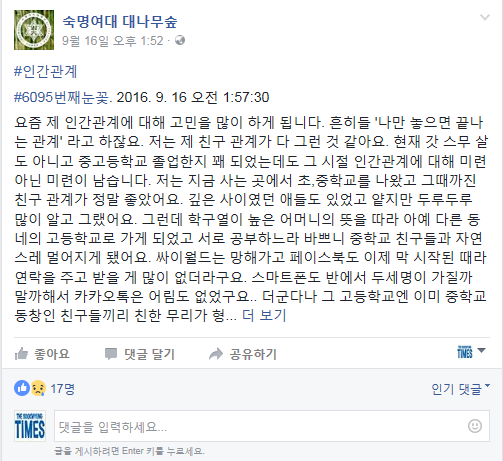
The cultivating and managing of a bamboo forest has become trendy. On average, about 10,000 visitor visit universities’ bamboo forests, and the number of visitors to more famous bamboo forests around the name is about 200,000. The types of visitors range from enrolled students to ordinary people. Have you been to a bamboo forest? Bamboo forests are now linking universities across Korea and have become a new trendy new culture at Korean universities.

Bamboo Forests in the Digital World
Are you familiar with the book ‘The king has donkey ears’? Just in case you are not, here is a brief introduction to the book. Once there lived a king who had ears as big as donkey ears. Because he wanted to keep his abnormality a secret, only his barber knew the truth. The barber often yearned to tell others of the king’s ears, but he knew if he did, he would certainly be put to death. Thus, one day he left for a lonesome bamboo forest and in a loud voice screamed out, ‘The king has donkey ears!’ The Facebook page ‘Bamboo Forest at OO University’ comes from this story. Like the bamboo forest in the story, bamboo forests all throughout Korean universities have become places where students may reveal their inner most secrets anonymously. When did this bamboo forest trend start? Seoul National University was the first university to establish a bamboo forest page on Facebook. Since then, other universities have created their own bamboo forest pages. There is even a bamboo forest at Sookmyung Women’s University, and it is overseen by 5 bamboo forest guards. The guards filter and control the uploading of posts reported by unknown users to keep the page clean and anonymous. On the Sookmyung Bamboo Forest page, along with enrolled students, outsiders are free to voice opinions on the site. According to one guard, students on domestic university exchanges often do not have any web community in which to attain information or express opinions, so this is really their own outlet. Moreover, by allowing other university students to enter the forest, the content becomes more flavourful.1)
As searching bamboo forest on facebook, there are about 50 running bamboo forest except page managed by department or other club, and on average, a ten thousand are following each page. The topics of discussion on bamboo forests are also various, ranging from daily life and dating to social problems like gender issues or problems on campus. The bamboo forests have become substitutes for the hand-written placards, banners, and posters of the past.

Anonymous Voices Changing Reality
Like the barber’s voice that changed the king’s attitude, anonymous voices impact reality. A bamboo forest on campus could solve on-campus problems; for instance, at Sookmyung last May, the school attempted to reduce its number of staffed guards and operate an automated security system. However, as criticism in the form of uploaded posts and protests increased, the school was forced to listen to the campus voice and retract its policy. In other words, the bamboo forest changed reality. Jang Deokjin, Sociolgy professor at Seoul National University, explains the bamboo forest phenomena like this: “The bamboo forest is the huge arena crowded with individuals of all kinds. Individuals are isolated alone, but can create a network in solidarity with other individuals and as one, they share the same identity.” 2) The bamboo forest has become one large individual with group identity, giving it greater influence.
Besides this, the bamboo forest is an open space for public forums as it is an open group on Facebook. Compared to hand-written posters of the past, it is much easier to express one’s opinion today as it is online and all users of a site are guaranteed anonymity. With all of these strengths, an increasing number of people are expressing themselves online. Because the bamboo forest at Seoul National University is followed by the greatest number of people, discussions happen there most often. Recently, there has been a discussion of sex workers. One prostitute posted: “I am a prostitute” on the webpage. While some responded with: “Nothing can rationalize and glamorize the prostitution profession,” others said, “Prostitution continues to exist throughout the ages because of demand."3) The essence of the problem is social structure; prostitution becomes a choice and a means of earning a living. Because of one user’s post and thanks to anonymity, people were able to freely debate the issue of prostitution.
The bamboo forests at universities are no longer exclusive forums; they are opening up to everyone. In the past, school community sites restricted membership to students only at their particular school. They operated on the basis of belonging, so they were closed and exclusive communities. However, the bamboo forest is new type of community; it is open to everyone. Although some universities like Sungkyunkwan University do not allow non-Sungkyunkwan students to upload posts onto the forest, it does respect everyone’s right to read and post comments. This openness highlights the bridge bamboo forests have formed among universities and their students; students, regardless of their school, are now about to share concerns and worries about life. At any one time, the bamboo forest at Seoul National University has approximately 200,000 users sharing and expressing opinions.

Responsibility Disappears into Darkness
Darkness comes to all places even to a bamboo forest. Ironically, the strength of a bamboo forest is also its weakness. Anonymity allows people to express themselves honestly and reveal deep secrets, which could reduce problems on campus. However, some people exploit the use of anonymity. Some upload false reports and others conduct witch-hunts. Two representative posts of these types are the ones on the bamboo forest at Hanyang University. Users, claiming to be employees of a certain restaurant, uploaded a spiteful post which said the eatery was filthy. The manager of the bamboo forest page uploaded the comment after deleting the name and location of the restaurant; however, a majority of the comment readers knew exactly which restaurant the post was referring to and uploaded the name of the eatery. As a result, the restaurant underwent a sanitation inspection, and its sales were hurt. A representative for the restaurant said, “I don’t understand why they would lie like that. We are now facing criminal charges and a civil case.”4)
Bamboo forest sites tend to contain unfiltered posts, and many contain sexual explicit and foul language. Seong Daehyeon, a university student, said “I think people feel sense of freedom when posting to bamboo forests in darkness because there is no filtering system.”5) However, unfiltered bamboo forests have all but disappeared. Last year, one bamboo forest site proudly said it would not filter its users’ posts, but soon changed its policy because of the number of endless arguments and the use of excessive verbal abuse and slander. Currently, there are only 11 unfiltered bamboo forest left, and of these, only 3 are active. Anonymity has become a double-edged sword.
To prevent witch-hunting and the spreading of false information caused by anonymity, some sort of management system is needed. For instance, at Hanyang University, the forest manager makes sure a post does not contain any clue as to where or whom the comment is about. Even though the filtering does not have to be this strict, there is a need for a certain level of filtering. The unfiltered bamboo forest webpage at Jungang University has only one rule: no posts making personal attacks permitted, and this includes any type of discrimination against genders and sexes. In other words, posts cannot harm the basic human rights of others. Thanks to the rule, the page operates fine, and it prevents any criminal behaviour such as slander. Therefore, to make proper use of anonymity and for the success and health of bamboo forests, a minimum amount of filtering is necessary.

Bamboo Forest an Alternative Means of Journalism
Compared to the past when journalistic reporting was mostly done in print, today’s bamboo forests open up an entirely new journalistic medium on campus. Students are busy trying to complete all graduation requirements and doing a lot of job-hunting, so they are now less interested in uploading comments. The role of the bamboo forest, however, is still big and seems to be evolving into a new form of journalistic medium to some degree because of its convenience. Unlike hand-written media or campus communities, bamboo forests do not center on one particular political issue or personal story. They are able to combine mass media stories with private personal stories, and this is the true attractiveness of the bamboo forests. As bamboo forests expand their usership, they will become more common communication and connection places.
1)Seo Bueng, “Are Bamboo Forests Really Anonymous?”, Daehaknaeil, July 4, 2016
2)Kim Seulgi, “Young Adults Visit Bamboo Forests with Secrets They Can’t State Openly!”, MBN, October 26, 2015
3)Online News Team, “Hype Over Female University Student’s Confession onto the Bamboo Forest of Seoul National University”, Heraldcorp, June 13, 2016
4)Kim Hyungjung, “ Bamboo Forests Are the Voices of University Students......Are They Reliable?”, News1, July 3, 2016
5)Kwon Seongheo, “Anonymous Bamboo Forests on Facebook; Do They Foster Suicide And Slander?”, The Asia Business Daily, May 2, 2016


